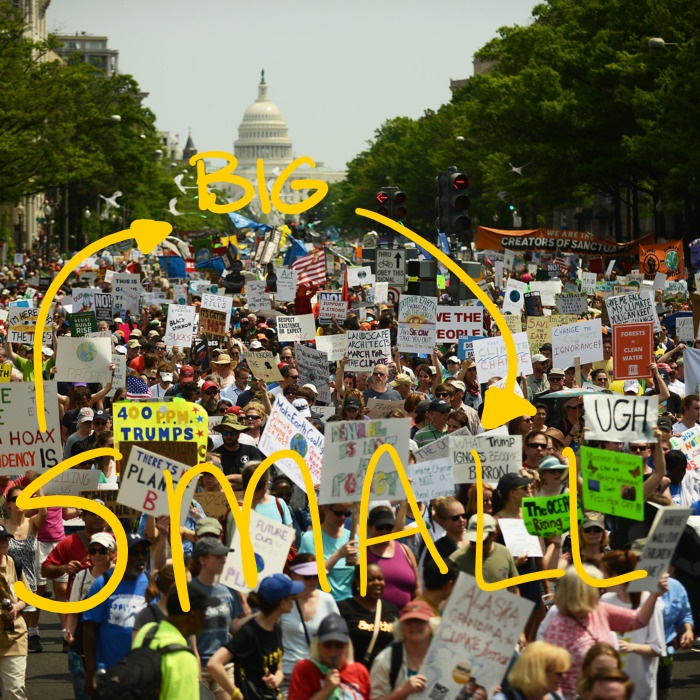
Situating involves zooming in and out, taking into account the variety of forces and perspectives that affect a place at every level so as to understand small and large implications.
This past week, we talked about the importance of balancing wide-view perspectives with scientifically-supported evidence that is grounded in a specific place or context. We are calling it situating. The recent IPCC report, (summarized in this NYTimes article) is an excellent example of this put into practice and a powerful advocate of the necessity of balancing extremes through a similar back and forth process that situating calls upon.
The reactions to the IPCC report have been extreme and negative because of its sobering message, which alters the previous warming limit of 3 degrees (Celsius) which may arrive in the relatively near yet somewhat distant future, to a new limit of 1.5 degrees (Celsius), predicted to arrive by 2040 if emissions continue at the current rate. That future is very near. This update is alarming, though perhaps not surprising.
What I still find surprising is how this continues to become an increasingly politicized issue. We are letting it tear us down, even though it offers such an incredible opportunity to build us up.
“Nothing unites humans like a common enemy.”
James Fahy
After the “zoomed-out” discussions we’ve been having about ecotypes and different types of environmental thought, I found myself appreciating the balance of perspectives the IPCC report says are necessary for success in climate mitigation and adaptation.
It highlighted the importance of both biocentric and anthropocentric intent: protecting earth’s natural systems and focusing on sustainable development of society go hand in hand, enhancing one another when implemented thoughtfully. So we may not have to choose one or the other — there will be trade-offs, but the synergies can outweigh them when it is done thoughtfully. Sustainable development (human-focused goals including poverty and equality) necessitates climate adaptation and protection of natural systems.
This thoughtful implementation they refer to requires both traditional and modern knowledge. More traditional, indigenous values of nature and Mother Earth are what guide individuals to care about the planet and the natural systems they are a part of. This gives the non-human a voice so that the natural world is advocated for when it comes to the goals and uses of modern knowledge factors such as science and technology.
“Collective efforts at all levels, in ways that reflect different circumstances and capabilities, in the pursuit of limiting global warming to 1.5oC, taking into account equity as well as effectiveness, can facilitate strengthening the global response to climate change, achieving sustainable development and eradicating poverty (high confidence)”
IPCC Special Report 2018
Further, this suggests the necessity of balancing small and big action. Governmental-scale actions are celebrated and made possible when local scale changes are made in people’s attitudes and behavior. Every place is impacted differently and poses a different array of synergies and trade-offs. No one global/governmental scale change will necessarily work for every place, so big-scale action without small-scale advocacy and support risks doing more harm than good.
In all these theme areas, the IPCC report advocates for a zooming in and out, in and out process that keeps both extremes in check. Neither extreme is right on its own, and yet both extremes are necessary.
The notion that “if everyone did what I do then there wouldn’t be a problem” clearly isn’t enough. And nobody wants the government to make all the decisions because no one entity can know what is best for such a huge diversity of situations. What works is when everyone does what they can at a small scale such that a culture is created in which those at larger scales that have more power make informed decisions and achieve more influence. And when governments create legal and infrastructural contexts that support individuals making the right decisions, they will do so.
Yes, the report is scary. The future outlook is not great when your view is limited to the silent and apathetic, even contrary response by the U.S. administration. Yet, action is being taken at small and large scales. In many ways, we are headed in the right direction. Many people, scientists, and policymakers, even countries are passionate about this work. Embracing collaborative action and modern innovations makes us adaptable. The message here is to work harder, smarter, and more thoughtfully in any way that we have the power to affect, in our own communities and in supporting governmental and international institutions.


